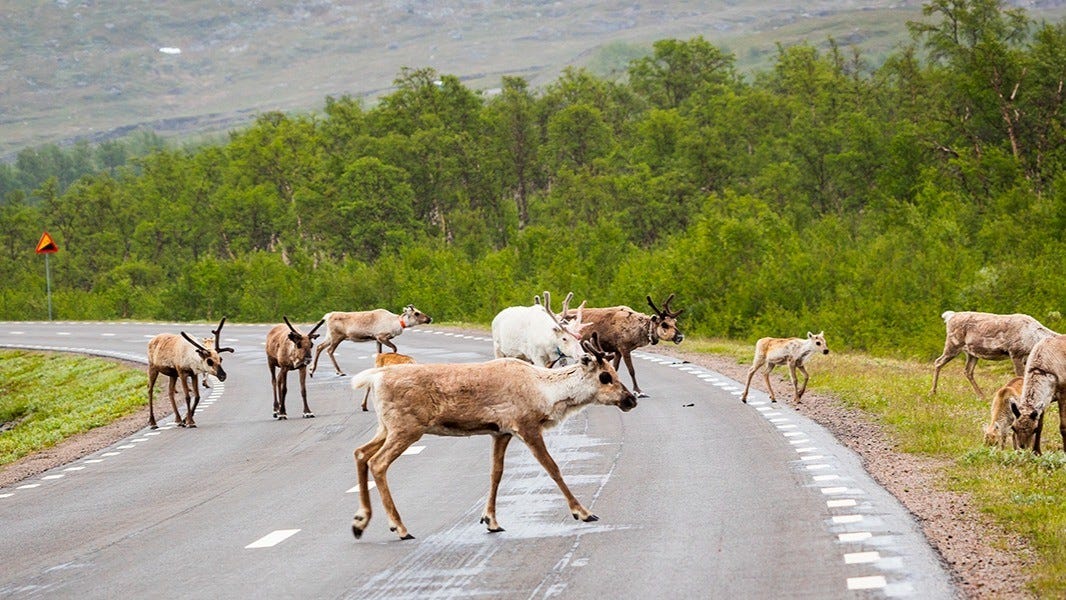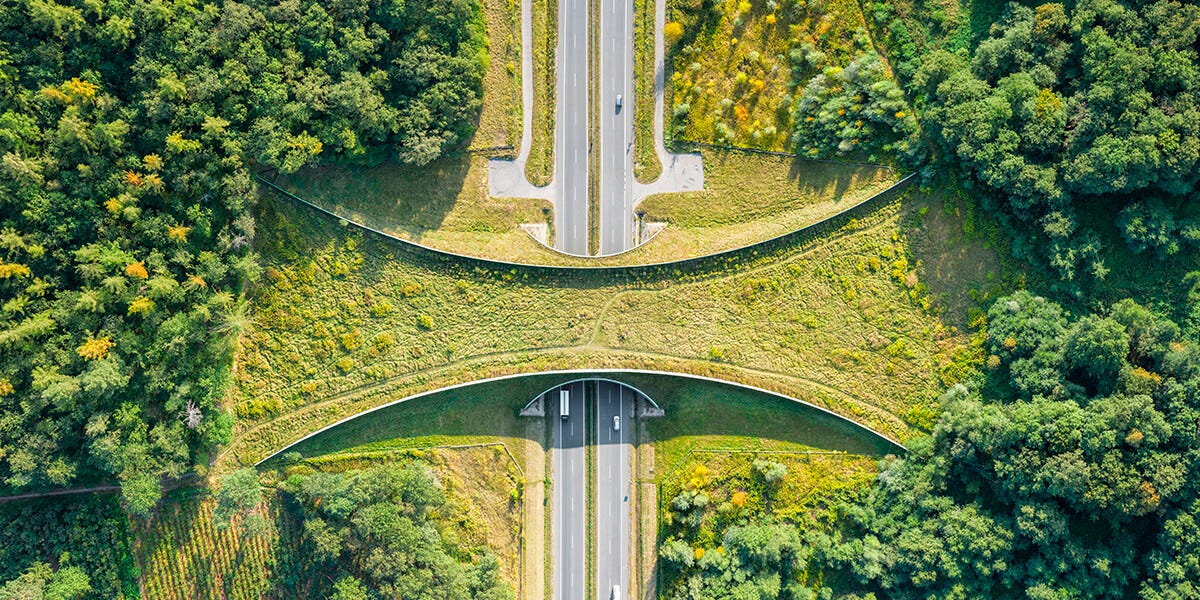Here's the rub: Even with the insane many roads (some 65 million kilometers) that are crisscrossing and fragmenting planet Earth, we could do far better by nature - by simply slowing down.
Road ecology is a relatively new field of research (the term was first used in Germany 'Strassenökologie in 1981) that studies the effects on nature by humanity's road systems. The first thing that'll come to mind for most of us will of course be roadkill. We've all seen critters large and small dead on or by the side of the road. Surprisingly, though, roadkill - as horrible as it is, is the least of nature's problems with our driven/driving species.
Fragmentation, poison, noise
As Paul Donald, author of "Traffication: How Cars Destroy Nature and What We Can Do About It" explains, far more pervasively destructive to nature are fragmentation, poison and noise. Roads fragment nature into patches of nature into islands surrounded by asphalt fences. And just to be clear, a horizontal road is as much a fence to many critters as would be vertical row of barbed wire.
Then there are the poisons that radiate from every road out into surrounding nature, be they emanating from exhaust pipes or - far more destructive these days - car tires. Microplastic particles are measured everywhere - spewed into the air by speeding cars, these particles make it into every aspect of nature. Bees, for example, will carry them along in their hairs, together with pollen, into their hive ... and yes, that's the honey on your breakfast table. These days, microplastic particles are everywhere and we, just as nature, ingest them all the time.
For the birds
And then there's the noise. Roads don't just fragment nature and release poisons in various forms to the detriment of biodiversity - they're also loud, very loud. In his book, Donald writes about country and city sparrows. Birds living near constant noise levels are forced to sing louder. To make their song heard, to attract females, they have to downright shriek their songs.
It has been observed that these songs become less compelling as birds cannot sing loud and complex at the same time. As said, many birds just won't take it and have left. Noise levels are one of the reasons why we see fewer and fewer birds. There's one positive aspect he noted: When COVID hit a few years back, road traffic was down to near zero for a while. Researchers noted that, within a single year, the songs of sparrows had reverted to their natural levels. So you see, if we'd just show a degree of greater consideration for nature - it would gladly return.
The EV fallacy
Lots of people might want to point out that, surely, things are getting a lot better now with the increasing number of electric cars on our roads. Not so, explains Donald. Electric cars tend to be heavier and increasingly fast. While the actual engine might be humming softly compared to a combustion engine, the tires of heavy and fast EVs deliver a lot of noise and even more microplastic particles. In addition, it's been studied in Australia that people driving electric vehicles - thinking themselves environmentally sound - actually drive on average 600 kilometers more per year than they previously did.
So here we are
More and more people, more and more roads, more and more cars - and no end in sight. I'd love to see our species taking decisive steps by actually removing roads to de-fragment, de-poison and de-noise nature. Rarely something like that happens (I'll have to write about an example near our home sometimes - an epic tale), but most often a road, once built, will be in use forever and ever. And so, for now, there's at least considerable push to create more and more wildlife crossings - either in the form of tunnels or bridges.
They very clearly work and make a huge difference as they allow nature to flow and connect across habitats ... but, as this article's title has already stated - there's a much simpler way to make a much bigger difference across the globe. Currently, when we race up and down our highways, we think it's safe since there are fences on either side, right? But we should think of the other ways our driving behavior destroys nature - think of noise and poison levels, think of engine and tires. By 'simply' lowing speed limits across cities, villages, regions, entire countries - we would do nature a world of good. Now wouldn't that be nice?
The benefits for our own species
There's of course ample scientific fact on how much of our physical and mental health depends on well-functioning ecosystems. We also know how much we psychologically benefit from slowing down - it benefits every aspect of our being alive. But hey, this is ever so much more stright-forward.
By slowing down, we would dramatically reduce traffic accidents and deaths of our own species. According to the United Nations (numbers published in 2021), there are between 20 and 50 million non-fatal injuries caused by road traffic accidents every year. Ever year 1.35 million people die because of car crashes - that's 1 person every 24 seconds. Every single day, over 500 children under the age of 18 die - because we drive the way we drive. Since our species is all about our species, these numbers should most certainly make a difference to us, right? Right?
You must have come across William Ernest Henley's Invictus poem. It famously ends with "I am the master of my fate, I am the captain of my soul." ... I often wonder about our species. We all our brainpower, with everything we've learned and know - how is it that we continue to allow ourselves to so utterly not masters of our fate?
Long story short
Not driving is great for the environment, but that's just not feasible for a large chunk of humanity that depends on the current road transportation system. Driving less is an option that more and more seem to embrace. Don't be fooled by having switched to an EV - if you drive as much as before, you're still harming nature, albeit differently.
The single best thing you can do then is, again, to collectively slow down.
Cheers,
Books on the subject
Traffication by Paul Donald
Crossings by Ben Goldfarb
Handbook of Road Ecology by Rodney van der Ree, Daniel J. Smith and Clara Grilo
Road Ecology by Richard T.T. Forman, Daniel Sperling, F. Swanson and Julia Jones
If you enjoy the Rewilder Weekly …
… please consider supporting my work. Your paid subscription will help generate the funds needed to realize a unique rewilding book I’m working on. And, of course, that paid subscription also ensures that the Rewilder Weekly will always keep going for those who cannot afford to pay. A thousand thanks!








